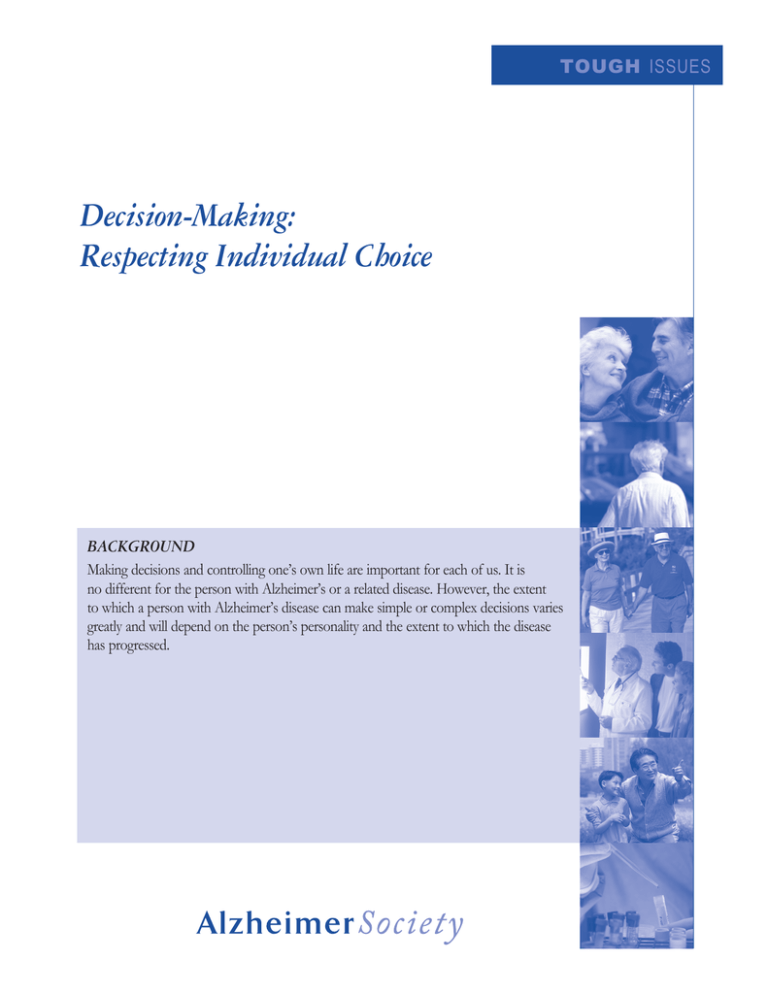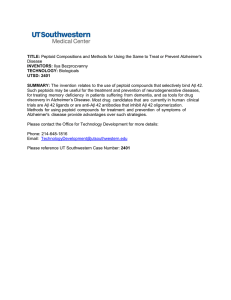
TOUGH ISSUES
Decision-Making:
Respecting Individual Choice
BACKGROUND
Making decisions and controlling one’s own life are important for each of us. It is
no different for the person with Alzheimer’s or a related disease. However, the extent
to which a person with Alzheimer’s disease can make simple or complex decisions varies
greatly and will depend on the person’s personality and the extent to which the disease
has progressed.
TOUGH ISSUES
Challenges of substitute decision-making: As a person
loses decision-making capabilities, decision-making
For people with Alzheimer’s disease:
will involve others, such as family members,
substitute decision-makers and health-care
Opportunities to make decisions: A diagnosis of
professionals. It can be difficult and highly stressful
Alzheimer’s disease, in itself, does not mean that a
person is immediately incapable of making decisions. for them to make decisions on another person’s
behalf. This is particularly so when the values and
However, as the disease progresses, a person’s
wishes of the person with Alzheimer’s disease are
decision-making abilities will change. With this
unknown, unclear or impossible to follow. Also,
change in abilities, caregivers may choose to make
the wishes of the person may conflict with those
all decisions and not present people with
Alzheimer’s disease opportunities to make decisions of the substitute decision-maker, family or society.
For example, a person could express a wish to live
of their own. This may occur not just with simple
at home, but unsafe smoking could put that person
day-to-day decisions but also decisions relating to
and neighbours at risk of fire. Also, if several
a person’s future care and support.
caregivers are involved in decision-making, they may
Respect for the person’s wishes: Sometimes those making not be able to agree on what the person’s wishes are.
decisions on behalf of the person with the disease
do not use the person’s wishes as a guide and put
PREFERRED CHOICES
their own interests first.
THE ISSUES
For family members and caregivers, substitute
decision-makers and health-care professionals:
Assessment of abilities: Those who provide assistance
and support may be unable to determine the extent
of a person’s decision-making capabilities and may
prematurely begin making decisions on that person’s
behalf. Alternatively, family members may find it
difficult to confront the person about the loss of
decision-making abilities. They may choose not to
take action even though they know that the person
is making poor decisions.
Recognize abilities
Recognize that the person still has abilities.
These abilities should be respected and encouraged.
Caregivers and family members should support
the person in making decisions independently, and
involve the person in decision-making while capable.
As well, it is important to draw up a plan for the
time when the person will not be able to make
independent decisions.
Plan for the future
While able, the person with the disease and the
substitute decision-maker should ideally take
Decision-making strategies: People who provide care
the opportunity to discuss openly and frankly
may not be aware of strategies that help make it
issues relating to future health care, personal care
easier for people with Alzheimer’s disease to make
and financial decisions. Wherever possible, legal
many of their own decisions. Or perhaps caregivers paperwork should be completed to ensure that the
find the strategies time-consuming. Also, they may
wishes of the person are recorded and a substitute
not realize how important decision-making can be to decision-maker is named. Laws about advance
maintaining a person’s confidence and self-esteem.
directives and substitute decision-making vary
from province to province.
• Listening and being sensitive to messages that
a person with Alzheimer’s disease can convey
As the disease progresses, those involved in
by facial expression, tone of voice and body
care should identify what abilities the person still has,
language. Feelings and emotions remain intact
break down complex tasks and decisions into more
long after words have lost their meaning. The
easily-managed options, and respect the person’s
person with Alzheimer’s disease can communicate
choices.
meaning to anyone who learns to read the
emotional signals conveyed.
Respect a person’s values and wishes
When the time comes that a person is no longer
Open discussion
able to make decisions, the substitute decision-maker
Most people are not comfortable about making
should follow the expressed wishes of that person.
plans for a time when they will be unable to
When these wishes are not known, the substitute
make decisions and have control of their own lives.
decision-maker should make the decision based on
Discussing personal values in relation to illness
what is thought the person would want. As well,
and death, finances and living arrangements, for
depending on the type of decision, the substitute
example, is difficult. But silence on these issues
decision-maker may have to weigh the risks and
can result in people being denied the opportunity to
benefits of the decision, and assess how it will affect
express and realize their wishes about their own care.
the person’s quality of life and well-being.
While able to make decisions, people should be
STRATEGIES TO FACILITATE
encouraged to discuss their choices and who their
DECISION-MAKING
substitute decision-maker will be with their family
members. Family members and substitute decisionsPersonal involvement
makers should be aware of what the person values
Feelings of independence and self-esteem are
and how the person defines quality of life. Discussion
encouraged when people are able to control or have of these matters helps give the person a sense of
a say in the day-to-day details of their lives. As the
control over future decisions, and provides support
abilities of the person with Alzheimer’s disease
and reassurance to future substitute decision-makers.
change, those who provide care and support need
to ensure that the person continues to be involved
in making as many decisions as possible.
Strategies to achieve this include:
Adjust to changing abilities
• Reducing the number of options at any one time.
For example, ask, “Would you like to have your
bath now or later?” rather than, “When do you
want a bath?”
• Providing step-by-step guidance. “Would you like
to go for a walk now?” “Would you like to wear
your blue or red sweater?” “Shall we go to the
garden or park?”
TOUGH ISSUES
Substitute decision-making
Substitute decision-makers should be selected. It
could be one person. Or, it could be someone for
health-care decisions and someone else for financial
decisions. In choosing substitute decision-makers,
consider their availability to take on the role,
understanding and respect for the values and wishes
of the person with the disease, ability to work with
others, and ability to resolve conflicts. Once the
substitute decision-maker is chosen, the person with
the disease and the substitute decision-maker may
want to talk about how disputes might be resolved
if they arise. Laws about substitute decision-making
vary from province to province. Contact your local
Alzheimer Society for more information.
Advance directive
The person’s values and wishes can be written down
in an advance directive. This is a document that
records a person’s wishes about the preferred type
of future care. Should the person become incapable
of making decisions in the future, the advance
directive will provide direction. Other terms used
for an advance directive in Canada include living
will, or enduring or durable power of attorney for
health care. Laws about advance directives vary from
province to province. Contact your local Alzheimer
Society for more information.
Competency assessment
are impossible to follow, there should be a review of
the decision based on:
• the values of the person with Alzheimer’s disease;
• the weighing of risks and benefits of the decision
to the person, caregivers, family members and
others who may be affected;
• the effect on the physical and emotional
well-being of the person;
• the effect on the quality of life of the person,
caregivers and family members.
If there is disagreement between the needs and
wishes of the individual and those expressed by
family members, caregivers and/or health-care
professionals, an impartial, trusted third party should
be consulted to assist in resolving the issue. With
some decisions, a resolution may take some time.
SOME TOPICS FOR DISCUSSION
Future health care
What kind of treatment would the person want for
other major health problems, such as heart disease
or cancer? Would elective surgery, such as cataract
removal, be considered? Decisions should take into
account the effect the treatment would have on the
person’s physical and cognitive health.
End-of-life care
For some major decisions, it may be necessary
to have experts assess the person’s ability to make
that particular decision. Regulations governing
competency assessment vary from province to
province. Contact your local Alzheimer Society
for information about the relevant regulations in
your province.
The chart outlines different approaches to treatment
that need to be understood when making decisions
for care in the later stage of the disease. Knowing
in advance the person’s wishes for these difficult
situations can ease the burden of making decisions.
However, health-care professionals may never offer
some choices if they would be ineffective or may
cause more harm than good.
When decisions become difficult
Finances
If the time comes that a substitute decision-maker
is called upon to make a decision on behalf of the
person, the expressed wishes of the person must be
followed whenever possible. If conflict develops, or,
if the person’s wishes are not known, are unclear or
Person responsible: Has someone been named to
look after the person’s financial interests? This may
or may not be the same person responsible for
decisions relating to health and personal care.
Decision-Making
Financial documents: Are financial and legal
documents, such as wills, insurance policies and
bank accounts, gathered together in a safe location?
Financial priorities: Have financial priorities been
set? For example, a person with Alzheimer’s disease
might indicate that the top priority for financial
resources be the promotion of the person’s comfort
and well-being.
Personal care
Language: What language should be used in
communicating with the person with Alzheimer’s
disease?
Food: Is there a specific type of diet the person
wishes to follow? Examples: vegetarian, kosher.
Hygiene: Is keeping well-groomed important? Are
there specific routines that the person wishes to be
followed? Examples: hair dyeing, beard trimming.
Clothing: Are there specific garments the person
wishes to dress in? Examples: a favourite sweater,
prayer shawl, turban.
Daily routines: Are there daily habits to be
followed? Is the person a morning person or a night
person? Examples: having tea before breakfast,
watching the news every evening.
Health routines: Are there any practices related to
health that the person wishes to be continued?
Examples: taking daily vitamins, special dental care.
Activities: Does the person want to continue to
pursue certain activities? Examples: daily walks, golf,
quilting, music.
Fears: Is there anything the person is
especially afraid of? Examples: dogs, storms,
loud noises, spiders.
Provision of care: When extra help is needed,
are finances available to provide this? When living
at home is not possible, what type of care facility
would the person prefer? Examples: small, large,
culturally-specific.
APPROACH TO TREATMENT WHAT IT MEANS
Aggressive Medical Care
Goal:To prolong life using all available types of treatment.
This could happen in either the hospital or at home.
For example, using tube feeding when swallowing is
no longer possible, or keeping a person on a respirator
when no longer able to breathe properly.
Conservative
Medical Care
Goal:To maintain or improve current health status.
Comfort or
Palliative Care
Goal:To provide active and compassionate care when cure is
not the goal.
Care that is considered routine or usual practice. For example,
using blood pressure medication to treat high blood pressure,
giving insulin for diabetes or antibiotics for an infection, or
setting a fractured hip.
The priority is symptom and pain control, as well as meeting
the physical, emotional, spiritual, social and cultural needs of
the person and the family.
TOUGH ISSUES
IN CLOSING...
RESOURCES:
Recognizing the abilities of the person with
Alzheimer’s disease is the key to supporting
decision-making that respects the person and offers
opportunities to promote independence and
self-esteem. When the person can no longer make
decisions, the individual’s values and wishes need to
be respected. These needs and wishes may have to
be balanced with the needs and wishes of families,
substitute decision-makers and health-care
professionals. Keeping the balance is not always
easy. Considerations such as family relationships,
the number and availability of caregivers, legal,
cultural, religious and financial factors may
influence the decision-making process.
Contact your local Alzheimer Society for
province-specific information on:
• Substitute decision-making for health
care and finances
• Advance directives
• Competency assessment
The Moral Challenge of Alzheimer Disease.
Ethical Issues from Diagnosis to Dying
(2nd ed.). Stephen Post, The Johns Hopkins
University Press, 2000.
For ordering: www.press.jhu.edu.
Alzheimer Society of Canada
20 Eglinton Avenue West, 16th Floor, Toronto, Ontario M4R 1K8
Tel: 416-488-8772 1-800-616-8816 Fax: 416-322-6656
E-mail: info@alzheimer.ca Website: www.alzheimer.ca
Facebook: facebook.com/AlzheimerSociety Twitter: twitter.com/AlzSociety
© 2007, Alzheimer Society of Canada. All rights reserved.
E300-4E 2015



